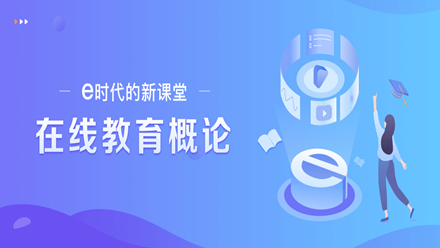
New course mode in e-era课程:前往报名学习

Learn what online education is, explore the development trends of online education, and find ways to solve problems existing in online education.
开设学校:清华大学;学科:教育教学、

Learn what online education is, explore the development trends of online education, and find ways to solve problems existing in online education.
-1.1.1 Online Education Brings the “New Classroom in the E-era”
--1.1.1 Online Education Brings the “New Classroom in the E-era”
-1.1.2 Opinions of Teachers and Students
--1.1.2 Opinions of Teachers and Students
-1.1.3 Characteristics of Online Education in China
--1.1.3 Characteristics of Online Education in China
-1.2.1 Conceptual Interpretation
--1.2.1 Conceptual Interpretation
-1.2.2 Development of Educational Technology
--1.2.2 Development of Educational Technology
-1.2.3 The Five-Element Model of Online Education
--1.2.3 The Five-Element Model of Online Education
-1.3.1 Opportunities
-1.3.2 Challenges
-1.4.1 Development in the 20th Century
--1.4.1 Development in the 20th Century
-1.4.2 Development in the 21st Century
--1.4.2 Development in the 21st Century
-1.4.3 Three Key Elements of Online Courses
--1.4.3 Three Key Elements of Online Courses
-1.4.4 Virtual Education Organizations
--1.4.4 Virtual Education Organizations
-1.5 Internal Systems and External Relations of Courses
--1.5 Internal Systems and External Relations of Courses
-Homework
-2.1 Educational Changes Brought by the Digital Age
--2.1 Educational Changes Brought by the Digital Age
-2.2.1 Development of Educational Needs
--2.2.1 Development of Educational Needs
-2.2.2 Learning Styles and Learning Types
--2.2.2 Learning Styles and Learning Types
-2.2.3 Multimodal Data Analysis of Students' Learning Behaviors and Needs
--2.2.3 Multimodal Data Analysis of Students' Learning Behaviors and Needs
-2.2.4 Educational Objectives
--2.2.4 Educational Objectives
-2.2.5 Expanding Learning Time and Space and Promoting Deeper Learning
--2.2.5 Expanding Learning Time and Space and Promoting Deeper Learning
-2.2.6 Autonomous Learning System Cases
--2.2.6 Autonomous Learning System Cases
-2.3 Online Education Helps Teachers' Development
--2.3 Online Education Helps Teachers' Development
-2.4 Why Should Schools and the Country Engage in Online Education?
--2.4 Why Should Schools and the Country Engage in Online Education?
-Homework
-3.1.1 Current Situation
-3.1.2 Platforms and Alliances
--3.1.2 Platforms and Alliances
-3.2 All Types of Teachers Can Benefit from Blended Teaching
--3.2 All Types of Teachers Can Benefit from Blended Teaching
-3.3.1 Current Problems in Teaching
--3.3.1 Current Problems in Teaching
-3.3.2 Benefits of Teachers and Students
--3.3.2 Benefits of Teachers and Students
-3.4.1 Key Point 1
-3.4.2 Key Point 2
-3.4.3 Key Point 3
-3.4.4 Misunderstandings Part 1
--3.4.4 Misunderstandings Part 1
-3.4.5 Misunderstandings Part 2
--3.4.5 Misunderstandings Part 2
-3.5.1 Overview
-3.5.2 Birth of the Rain Classroom
--3.5.2 Birth of the Rain Classroom
-3.5.3 Rain Classroom Functions
--3.5.3 Rain Classroom Functions
-3.5.4 Classroom Teaching Needs Rain Classroom
--3.5.4 Classroom Teaching Needs Rain Classroom
-3.5.5 Rain Classroom Solves the Problem of Limited Face-to-Face Teaching Time
--3.5.5 Rain Classroom Solves the Problem of Limited Face-to-Face Teaching Time
-3.5.6 Rain Classroom Solves the Learning Problem Before Class, in Class and After Class
--3.5.6 Rain Classroom Solves the Learning Problem Before Class, in Class and After Class
-3.5.7 Key Points in the Design of Pre-Class, In-Class and After-Class Rain Courseware
--3.5.7 Key Points in the Design of Pre-Class, In-Class and After-Class Rain Courseware
-Homework
-4.1 Vision of Online Education in Practice(1) Innovation of Education
--4.1 Vision of Online Education in Practice(1) Innovation of Education
-4.2 Innovation in Education Practice (2) Education Technology and Policy
--4.2 Innovation in Education Practice (2) Education Technology and Policy
-4.3 Hotspot and Trends of Education Theories
--4.3 Hotspot and Trends of Education Theories
-Homework
-5.1.1 How to Create a MOOC and Usage Tips (Part 1)
--5.1.1 How to Create a MOOC and Usage Tips (Part 1)
-5.1.2 How to Create a MOOC and Usage Tips (Part 2)
--5.1.2 How to Create a MOOC and Usage Tips (Part 2)
-5.2.1 Teaching Philosophies and Key Parts of Blended Teaching
--5.2.1 Teaching Philosophies and Key Parts of Blended Teaching
-5.2.2 An Example of a Specific Chapter
--5.2.2 An Example of a Specific Chapter
-5.3.1 Blended Teaching Design Tips
--5.3.1 Blended Teaching Design Tips
-5.3.2 Teaching Design for the "University" Unit
--5.3.2 Teaching Design for the "University" Unit
-5.4.1 A Completely Flipped Classroom for a Small Class
--5.4.1 A Completely Flipped Classroom for a Small Class
-5.4.2 A Partially Flipped Classroom for a Large Class
--5.4.2 A Partially Flipped Classroom for a Large Class
-5.5 A Case Study of Zheng Li's Teaching Approaches for "C++ Program Design": Rain Courseware Example
--Video
-Homework
于歆杰,清华大学电机系党委书记,教授,中国电机工程学会电工理论与新技术专委会副主任委员,中国电工技术学会电磁发射技术专委会副主任委员,教育部高校在线教学国际平台与课程建设专家顾问组副组长,教育部高等学校工科基础课程教指委秘书长,教育部教学信息化与教学方法创新教指委委员,教育部在线教育研究中心智慧教学实验室主任,清华大学在线教学指导专家组组长,国际电磁发射杰出贡献Peter Mark奖章、北京市教学名师奖、清华大学首届新百年教学成就奖和宝钢优秀教师奖获得者,清华大学首门慕课、标杆课、国家级精品资源共享课、国家级精品在线开放课“电路原理”负责人。
于世洁,北京信息科技大学党委常委、副校长,教育部高等学校教学信息化与教学方法创新教学指导委员会委员,博士,研究员。曾获国家科技进步二等奖、北京市教学成果二等奖、清华大学教学成果特等奖、清华大学实验技术成果一等奖等奖励。

